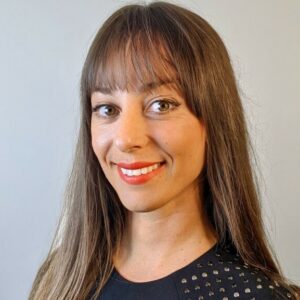Marija Čolić
Assistant Professor

"It is important to remember that parents trust us with their children, with their most valuable treasure and therefore it is our responsibility to continuously learn so we can support them and give them the best chances for success."
Hometown
Kragujevac, Serbia
Department
Special Education
Briefly describe your role in the Department of Special Education.
I teach courses in Applied Behavior Analysis intended for both post-baccalaureate students seeking a teaching license and students pursuing master’s degree and/or certification to become a board certified behavior analyst (BCBA). I also provide field based supervision to students in school settings who are pursing their BCBA certification.
How did you first become interested in the field of special education?
There had not been a specific moment that sparked my interest; I feel like I knew I will support exceptional people since my elementary school. I was one of those kids who always had time to hear out friends who were excluded from the peer group due to their disabilities and of course, always fought for them if someone was bulling them. I believe my behavior was reinforced, as it made me feel good seeing how much they were happy to talk about their interest and they had someone to listen to them.
What is your philosophy of teaching?
My aim is to motivate students to become effective and ethical teachers and BCBAs who, in the future, will contribute significantly to the growth of students with disabilities. One of the critical aspects of my instructional philosophy is to create an interactive and nutritive learning environment in the classroom, where students know that I am invested in their academic advancement and they can ask me questions freely. Also, I believe that it is important to build relationships and trust with the students so they can always feel free to ask for my support. This is especially important for online courses where face-to-face contact is limited, so I always strive to create multiple opportunities for discussion, building rapport, and trust during class.
What types of candidates do you hope/recommend to pursue one of our ABA or special education programs?
Passionate. Caring. We need passionate and caring candidates who truly want to help children and adults with disabilities and their families. It is important to remember that parents trust us with their children, with their most valuable treasure and therefore it is our responsibility to continuously learn so we can support them and give them the best chances for success. If you are passionate about working with children and are ready to learn, our department will help you in achieving your goals through mentoring and continuous feedback.
Describe your own road to higher education.
As a high school student I was very interested in psychology and diversity in thinking and I have been always analyzing behaviors and thoughts. I was interested primarily in getting a degree in psychiatry as I wanted to support diverse people better. But medicine was not my passion so I decided to enroll in a special education program in order to learn how to support people with autism and intellectual disabilities. Fun fact is that in Serbia you have to choose a major from day one and as a student you focus extensively on that one discipline. Thus, I studied multiple aspects in the field of disability for 5 years, such as genetics, neuropsychology, special education, different treatments, assessments, and numerous theories about disabilities. But my passion for psychology had never stopped and I decided to enroll in a psychology program and for 5 years I was studying psychology, focusing mainly on social psychology and research. Combining these two learning paths and disciplines gave me a very wide perspective on understanding people with disabilities and their families. Naturally, my PhD combined these two approaches and I mainly specialized in autism and social aspects surrounding autism. So, where is ABA in all of these? I obtained my BCBA when I came to the United States and started working as a behavioral specialist in New York State. I feel that by getting more extensive knowledge on behaviorism and ABA I was finally able to complete a circle of my thoughts starting back in high school.
What are your research interests?
Stigma in people with autism, developmental disabilities and their caregivers and parental experiences of children with autism (such as with services, diagnosis, etc.).
Check out this news announcement about Dr. Čolić’s International Autism Research Award
What do you like to do outside of education?
Surfing. Surfing has become my passion as well… There is no one word to describe surfing, but I tried to depict it somehow 🙂
Surfing = Happiness
Surfing = Self-reflection
Surfing = Learning about yourself
Surfing = Learning about others
Surfing = Challenge
Surfing = Learning to overcome embarrassment
Surfing = Natural High (As Machado said it)
Surfing = Love
Surfing = Self-determination
Surfing = Observation
Surfing = Aloha
Surfing = Endurance
Surfing = Adventure
Surfing = Friendship
Surfing = Marine life
Surfing = Reef
Surfing = Peace
Surfing = Ocean = Life
